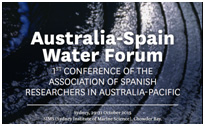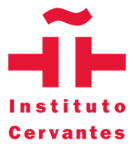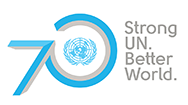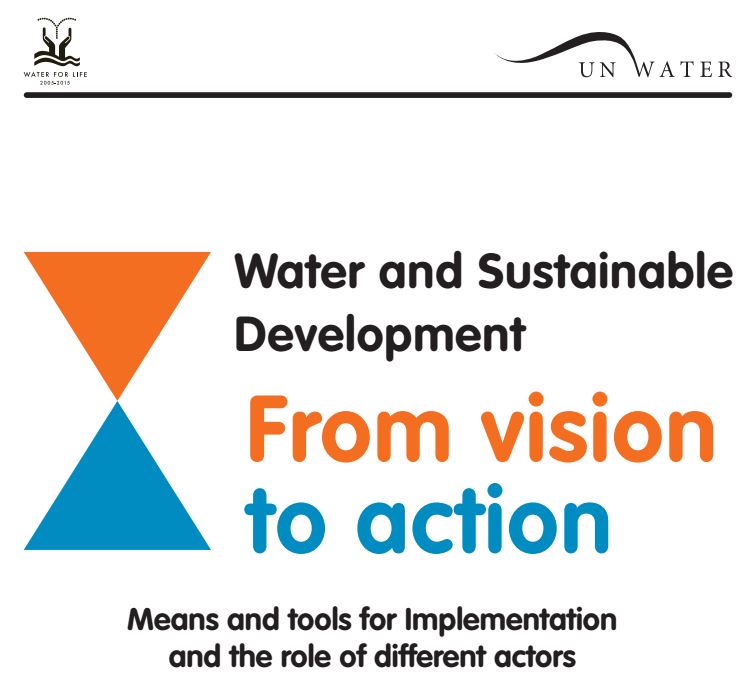- ON THE DECADE
- THE DECADE'S CAMPAIGN
- REPORTING ON PROGRESS
- THE DECADE'S PROGRAMMES
- FOCUS AREAS
-
- Access to sanitation
- Financing water
- Gender and water
- Human right to water
- Integrated Water Resources Management
- Transboundary waters
- Water and cities
- Water and energy
- Water and food security
- Water and sustainable development
- Water and the green economy
- Water cooperation
- Water quality
- Water scarcity
- FOCUS REGIONS
- RESOURCES FOR
- UN e-RESOURCES
UNW-DPAC: Events agenda
2012
6th session of the Meeting of the Parties to the Water Convention
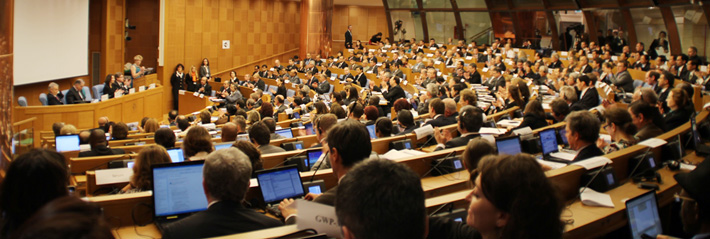 Date: 28-30 November 2012
Date: 28-30 November 2012
Place: Chamber of Deputies, Rome, Italy
In preparation of the 2012/2013 UN-Water Annual Zaragoza Conference and the International Year of Water Cooperation, the United Nations Office to Support the International Decade for Action ‘Water for Life’ 2005-2015 (the Office), participated and supported communication actions for the 6th Session of the Meeting of the Parties to the Water Convention (MOP6). The meeting of the Parties to the Water Convention was attended by more than 320 people. MOP6 addressed many substantive issues related to the work of the Convention such as its opening to all members beyond the UNECE region, support for implementation and compliance, transboundary groundwater, a thematic assessment on the water-food-energy ecosystems nexus, water and adaptation to climate change, cooperation with other multilateral environmental agreements and international partners, vision for the future of the Water Convention, and the programme of work for 2013-2015.
The Office implemented interviews with Mr. Massimo Cozzone, Ministry for the Environment, Land and Sea of Italy and Vice-Chairperson of the Meeting of the Parties to the UNECE Water Convention; and with Mr Dejan Komatina, Secretary of the International Sava River Basin Commission. Four video interviews have also been prepared by the Office with: Mr. Ilya Trombitsky, Executive Director, Eco-TIRAS, Republic of Moldova; Mr. Dejan Komatina, Secretary of the International Sava River Basin Commission, Croatia; Mr. Peter Kovacs, State Secretary for Water, Ministry of Rural Development, Hungary; Mr. John Matthews, Director, Freshwater Climate Change, Conservation International.
CONAMA 2012: Spanish National Environmental Congress
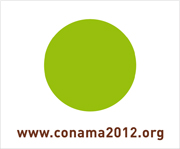 Date: 26-30 November 2012
Date: 26-30 November 2012
Place: Madrid, Spain
Organisers: Fundación Conama
Josefina Maestu, director of UNW-DPAC, participated in CONAMA 2012, thematic area on water, session ‘Action for water. The international agenda and management challenges’ on 27 November 2012 from 9:30 to 11:30, Sala Madrid. Josefina Maestu addressed questions such as ‘How has Rio+20 changed the water international agenda?’ or ‘How is water considered in the post-2015 process?’
>> Presentation on what has Rio+20 changed on the international agenda? by Josefina Maestu
7th Social Responsibility Forum 2012
 Date: 23-24 November 2012
Date: 23-24 November 2012
Place: Madrid, Spain
Organisers: IE Business School
Josefina Maestu, director of UNW-DPAC, participated in the session ‘Is water the new oil?’ which took place on Saturday 24 November 2012 from 11:00 to 12:15. Ms. Maestu addressed the issues of water scarcity and water management in the near future, she also presented a summary of the Rio+20 summit.
International Workshop ‘Water Allocation and Green Growth’
 Date: 22-23 November 2012
Date: 22-23 November 2012
Place: Wageningen, the Netherlands
Organisers: The Government of the Netherlands in cooperation with the Netherlands National Commission for UNESCO, the Netherlands’ IHP Committee and OECD.
Josefina Maestu, director of UNW-DPAC, participated in session ‘The information base for water allocation’ on 23 November 2012 from 9:00 to 11:00 with a presentation on ‘Water trading as a tool to reveal information. Lessons from international experience’. The outcome of the workshop feed into the OECD programme on water allocation for green growth, which aims to provide policy makers with practical guidance on water allocation in a context characterised by increasing competition between water users, uncertainty about future water availability (driven by climate change), and a need to manage water so that it contributes to green growth.
Environment and sustainability. Post-2015 consultation in Spain
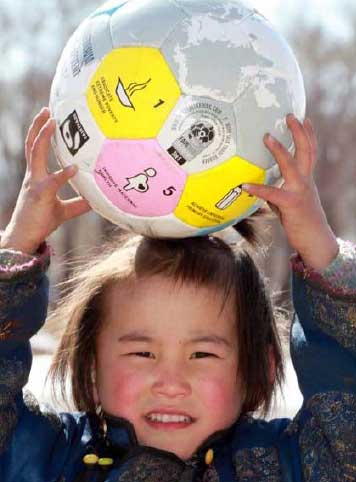 Date: Monday, 17 September 2012
Date: Monday, 17 September 2012
Place: Zaragoza, Spain
The post-2015 process refers to the issues and dialogue for advancing the UN development agenda beyond the 2015 MDG deadline. The United Nations is planning to organise a series of 50+ national consultations to solicit input from citizens and organisations at country level. These will inform the report of the High Level Panel on Post 2015 as well as the subsequent UN Secretary Generals official report to the 2013 UN General Assembly, which is likely to hold a special session on Post 2015.
Organized by the UN Office to support the Decade and the Millennium Campaign in Spain, this meeting aimed at preparing a set of preliminary priorities in the field of the environment and sustainability in view of the post-2015 development agenda. These conclusions will be presented and debated in a joint consultation meeting that is taking place on 16 October and which will have the participation of representatives from youth, development, human rights, the environment and sustainability and representatives from different institutions and experts from different fields.
>> Programme of the meeting [
 – 176 KB]
– 176 KB]
>> Conclusions from the 'Environment and Sustainability' Post-2015 consultation [
 – 49 KB]
– 49 KB]
>> Summary of Post-2015 consultations with the Spanish civil society 

Water for Cities World Conference Series went to Morocco
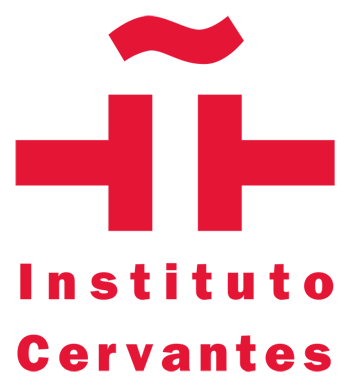 Université Abdelmalek Essâadi F.S.T., Tangier. 26 September 2012 at 4:00 pm
Université Abdelmalek Essâadi F.S.T., Tangier. 26 September 2012 at 4:00 pm
Université Cadi Ayyad, Marrakech. 28 September 2012 at 4:30 pm
In the framework of the World Conference Series on "Water and Cities" organized by UNW-DPAC in collaboration with the Cervantes Institute and UN-Habitat, Ms Pilar González, awareness raising expert at the UN-Water Office in Zaragoza, talked about the water and sanitation challenges which are affecting the sustainability of cities in today's world. There was also a viewing of a documentary on Lake Victoria produced by UN TV and UNW-DPAC.
>> More information about the Conference in Tangier
>> More information about the Conference in Marrakech

UNW-DPAC at World Water Week
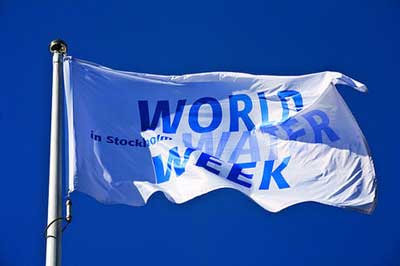 Date: 26-31 August 2012 Place: Stockholm, Sweden
Date: 26-31 August 2012 Place: Stockholm, Sweden
Organized by the Stockholm International Water Institute (SIWI), the World Water Week brings together experts, practitioners, decision makers and leaders from around the globe to exchange ideas, foster new thinking and develop solutions to solve the world's water crisis. Each year the World Water Week addresses a particular theme to enable a deeper examination of a specific water-related topic. The thematic scope for 2012 has been "Water and Food Security".
UNW-DPAC participated in different sessions, including:
- The Drive to 2015: Big or Small – Sanitation for All!
Date: 26 August 2012 Time: 12:45
The Drive to 2015 campaign calls for ending open defecation and urges all to tackle this inequity by giving priority to the poorest and most marginalized populations. The Drive's latest campaign materials will be presented at this event and discussions will explore how equity-focused approaches can help to realize the right to sanitation. The discussion with panelists was moderated by Josefina Maestu, UNW-DPAC coordinator.
Place: Room K16/17 - UN-Water Stakeholder Dialogue: Green Accounting and World Water Scenarios for Our Future
Date: 26 August 2012 Time: 14:00
This UN-Water Stakeholder Dialogue will highlight current Water Scenarios and Green Accounting initiatives. Topics will be discussed by experts and stakeholders in two panels, and probing questions posed to panelists. Josefina Maestu facilitated panel 1 'Green Accounting – Current and Future Initiatives'.
Place: Room K16/17 - UN International Year and World Water Day 2013: Water Cooperation
Date: 27 August 2012 Time: 15:45
This seminar introduced the preparations being made for the International Year and World Water Day 2013 on Water Cooperation. It provided information about the planned activities and initiatives and also offered the opportunity to gather inputs and commitments from stakeholders. Josefina Maestu introduced the 3rd edition of the 'Water for Life' UN-Water Best Practices Award, which focuses on water cooperation.
Place: Room K16/17
>> UNW-DPAC Agenda in Stockholm World Water Week 2012 [ – 100 KB]
– 100 KB]
Water for Cities World Conference Series goes to Tokyo, Japan
 Date: 11 July 2012 Time: 18:30
Date: 11 July 2012 Time: 18:30
Venue: Cervantes Institute, Tokyo, Japan
On 11 July, the fourth of the World Conference Series on "Water and Cities" organized by UNW-DPAC in collaboration with the Cervantes Institute and UN-Habitat took place. Ms Josefina Maestu, Director of the UN-Water Office in Zaragoza, talked about the challenges and solutions to providing basic water and sanitation services in different regions of the world. She was joined by Dr Kotaro Takemura, president of Japan Water Forum, and Kazunari Yoshimura, director of Global Water Japan, to discuss efficient and sustainable water use. There were also be a viewing of the documentary on Lake Victoria produced by UN TV and UNW-DPAC.
>> Cervantes Institute in Tokyo 
>> Photogallery on Flickr
UNW-DPAC at Rio+20
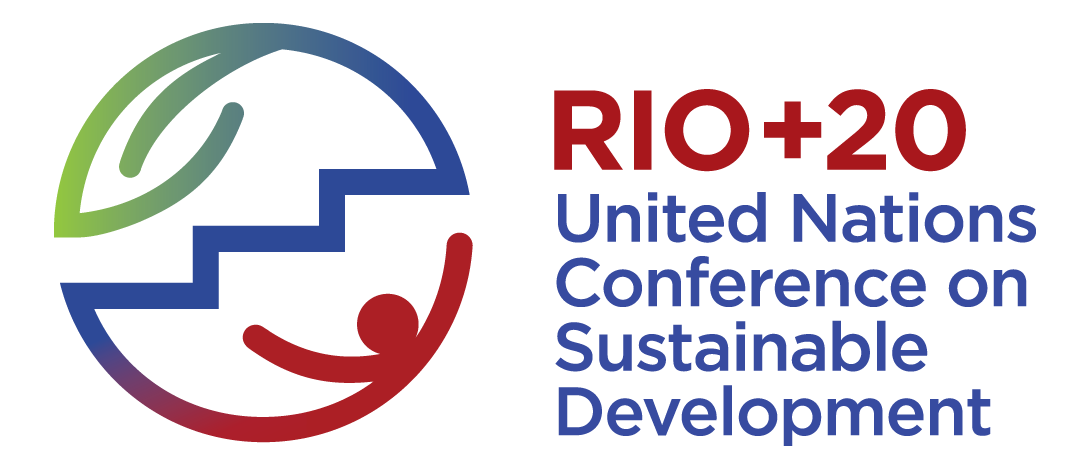 From 20 to 22 June 2012, Rio+20 has provided an historic opportunity to define pathways to a safer, more equitable, cleaner, greener and more prosperous world for all. The UN-Water Decade Programme for Advocacy and Communication's participation have actively supported these efforts as relates to water. The Office's major contribution in the preparatory process in 2011 was the UN-Water Zaragoza Conference on Water in the Green Economy in Practice: Towards Rio+20, which focused on means of implementation, and the UN-Water Session at the Bonn Nexus Conference. In the final sprint and during Rio, the Office has collaborated with the UN Secretariat Department of Public Information Mini Campaign on Water; has prepared a "just in time" Web page on Water in Rio including Web news - as days progressed; a twitter feed on water in Rio, both in English and Spanish; has prepared interviews with major stakeholders and has implemented other media related efforts; and has prepared some information products and other publications for Rio.
From 20 to 22 June 2012, Rio+20 has provided an historic opportunity to define pathways to a safer, more equitable, cleaner, greener and more prosperous world for all. The UN-Water Decade Programme for Advocacy and Communication's participation have actively supported these efforts as relates to water. The Office's major contribution in the preparatory process in 2011 was the UN-Water Zaragoza Conference on Water in the Green Economy in Practice: Towards Rio+20, which focused on means of implementation, and the UN-Water Session at the Bonn Nexus Conference. In the final sprint and during Rio, the Office has collaborated with the UN Secretariat Department of Public Information Mini Campaign on Water; has prepared a "just in time" Web page on Water in Rio including Web news - as days progressed; a twitter feed on water in Rio, both in English and Spanish; has prepared interviews with major stakeholders and has implemented other media related efforts; and has prepared some information products and other publications for Rio.
Communication activities  include the preparation of an Information Note on Questions and Answers on Water in Rio
include the preparation of an Information Note on Questions and Answers on Water in Rio  and the Water Calendar for Rio; the contribution to the Media Workshop organized by the UNRIC of Mexico; the preparation of booklets on Water Planning in Transition to a Green Economy
and the Water Calendar for Rio; the contribution to the Media Workshop organized by the UNRIC of Mexico; the preparation of booklets on Water Planning in Transition to a Green Economy  and Water and a Green Economy in Latin America and the Caribbean
and Water and a Green Economy in Latin America and the Caribbean  ; the media dissemination and response to enquiries of African Journalists (Ghana, Kenya, Zambia), Chinese TV, Al-Ahram English Edition.
; the media dissemination and response to enquiries of African Journalists (Ghana, Kenya, Zambia), Chinese TV, Al-Ahram English Edition.
In the aftermath of Rio, the office has prepared the Report on the UN-Water organized Water Day at Rio (forthcoming), and is preparing a media analysis of coverage, and an Information Note on Water at Rio focusing on what Rio has meant for the International agenda on water. The Director of the office has attended media (radio and press) requests related to what Rio has meant for water.
"Water and the Green Economy: Expectations for Rio+20". Conference series on "Possible Utopias: Millennium Development Goals"
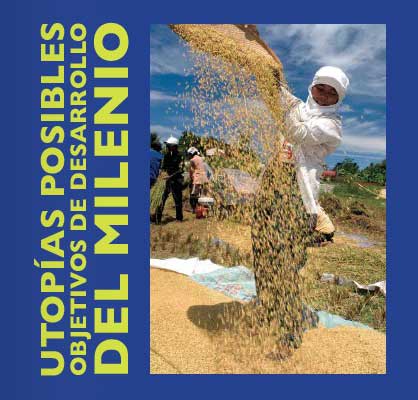 Date: Thursday 21 June 2012
Date: Thursday 21 June 2012
Time: 20:00
Venue: Events Hall at the Valencian Institute of Modern Art (IVAM). 118 Guillem de Castro Street, 46003 Valencia, Spain.
Josefina Maestu, director of UNW-DPAC, participated in the conference series "Possible Utopias: Millennium Development Goals" with a presentation on "Water and the Green Economy: Expectations for Rio+20". This series takes place alongside the exhibition "Possible Utopias: Millennium Development Goals" from May 31 to September 16, 2012.
The poverty agenda, and the concern with equity and planetary boundaries were very much at the center of the Rio preparatory discussions. If there is an issue overwhich inequility and planetary limits is compelling, it is water. Rio represented a unique opportunity not only to assess progress but also to boost commitment from governments and stakeholders to implement actions to address these. Actions should be focused on providing basic services to the bottom billion and on environmental degradation.
Both the exhibition and the conference series taking place at the IVAM are organized by the Spanish branch of Le Monde diplomatique, the MONDIPLO Foundation in collaboration with the FAO's Information Office in Spain and the Millennium Development Goals Campaign.
The International Network of Drinking-Water Regulators (RegNet) and the International Small Community Water Supply Management (SCWSM) Network meet in Zaragoza, Spain
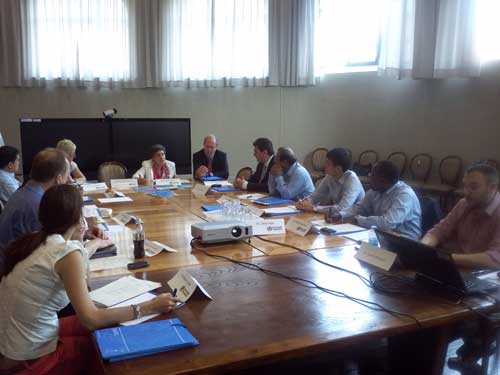 Date: 4-8 June 2012.
Date: 4-8 June 2012.
Place: Paraninfo of the University of Zaragoza, Zaragoza, Spain
Members of the International Network of Drinking-Water Regulators (RegNet) and of the International Small Community Water Supply Management (SCWSM) network, both networks hosted by the World Health Organization (WHO), convened three different working meetings in Zaragoza, Spain, this week. Issues addressed included risk assessment tools and questions related to the implementation of water safety plans, especially among small community water operators in both developing and developed countries.
UNW-DPAC hosted these meetings and contributed to the programme agenda with a presentation about UN-Water and the work of the Office, presented a water operators' communications best practice guide for discussion and organized a brainstorming session for the preparation of a plan for advocacy and communication on water regulation.
- 4-5 June 2012: Risk Assessment Tool for Small Community Water Supplies Working Group Meeting. The goal of the International Small Community Water Supply Management (SCWSM) Network is to support the mainstreaming and improved management of small community water supplies in collaboration with stakeholders at all levels to achieve universal, sustainable access to safe drinking water. The SCWSM has recommended and commissioned the development of a Risk Assessment Tool for small community water supplies. During this meeting, the working group reviewed and provided comments and suggestions to the work done to date to ensure that the risk assessment tool is complete and includes issues related to the risk assessment and risk management process.
- 5-7 June 2012: 6th meeting of the International Small Community Water Supply Management Network. During this meeting, the network reviewed and updated its work programme, made recommendations for technical documents and tools, and served as a platform for the exchange of information between network members.
- 7-8 June 2012: The International Network of Drinking-Water Regulators (RegNet). The International Network of Drinking-Water Regulators (RegNet) was established in response to requests from WHO Member States to share and discuss strategies to address water-regulation issues in an international forum. The goal of RegNet is to increase, by 2015, WHO Member States' awareness of the primary importance of ensuring that preventing waterborne disease and protecting and promoting public health, as it relates to drinking water, is reflected in their regulatory frameworks. During this meeting, the network discussed issues related to its work programme including issues related to the WHO Lexicon, progress on the development of the risk assessment tool, and updates on case study development and on the publishing of Valuing Water, Valuing Livelihoods among others.
>> Summary Report of UNW-DPAC Communication and Advocacy activities at the meetings 
3rd UN Water Dialogue of Casa Solans: Water Safety Plans
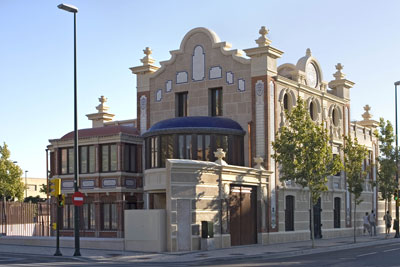 Date: 4 June 2012
Date: 4 June 2012
Place: Ebro River Basin Authority (CHE)
As part of the UN Water Dialogue Series in Casa Solans, this 3rd dialogue addressed the issue of Water Safety Plans (WSPs). The 3rd edition of the World Health Organization (WHO) Guidelines for Drinking Water Quality recommends the adoption and implementation of Water Safety Plans as the most effective means to consistently ensure the safety of drinking-water supplies at all levels, from catchment to consumer. This integrated tool requires engaging all stakeholders, from health and environment authorities to water operators and consumers. WSPs should be implemented within a public health context, respond to standard health and quality indicators and checked by independent surveillance. To debate on Water Safety Plans, implementation protocols and on specific challenges during the implementation phase in Spain and other countries, national experts and officers met and shared their experiences and recommendations with WHO representatives participating in this 3rd Dialogue.
>> Final Report on 3rd UN Water Dialogue in Casa Solans: Water Safety Plans [
 - 920 KB]
- 920 KB]
>> Dialogue Agenda 

Meeting of the Working Group CONAMA 2012: Creating networks towards Rio+20
 Date: 30 May 2012
Date: 30 May 2012
Place: Escuela de Organización Industrial (EOI), Madrid, Spain
The Director of UNW-DPAC participated in a meeting convened by ECODES and the CONAMA Foundation under the heading Creating networks towards Rio+20 which was held on 30 May 2012 in Madrid. The Director of UNW-DPAC highlighted the participative and open character of the Rio+20 Summit and encouraged the civil society to keep actively involved during the Conference. She also transmitted to the participants UN Secretary General's expectations on the outcomes of ongoing negotiations.
This meeting of key Spanish actors on sustainability issues was intended to take advantage of the momentum generated by the Rio+20 Conference to: share agendas, positions and specific commitments for Rio; motivate support from Spanish organisations to global initiatives promoted on the occasion of Rio, such as the Green Economy Coalition or the Global Union for Sustainability; make visible actions for an inclusive and responsible green economy from social, corporate and public organisations before and after Rio+20; and identify joint action lines and tools for the post Rio+20 process. During the round of interventions, the Director introduced water-related activities that will take place in Rio, the Water Day organized by UN-Water and how water is included in the negotiated document. Concerning voluntary actions and commitments, the director introduced the dedicated Water at Rio+20 section on the Decade's website, which includes a water-calendar at Rio+20 summarizing all water-related events taking place in Rio, and the commitment to use this section for the follow-up of the Rio process regarding water after the Summit.
Green Week ‘The Water Challenge - Every Drop Counts’
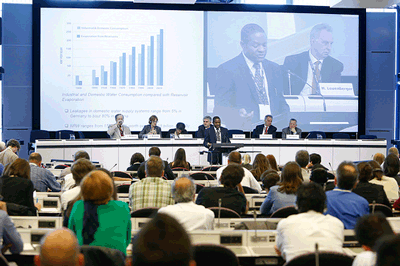 Date: 22-25 May 2012
Date: 22-25 May 2012
Place: Brussels, Belgium
Under the banner ‘The Water Challenge – Every Drop Counts’, this year's edition of Green Week was dedicated to water. Stakeholders, NGOs, government representatives and EU officials searched for solutions to key water problems, like how to safeguard the availability of good quality water against a backdrop of rapid population growth and ever more apparent climate change.
On 23 May, Josefina Maestu, Coordinator of UNW-DPAC, participated in session 4.4 Sustainable water management for a green economy. During the session, there were questions on the need for a social green economy (incorporating participation of local people and appropriate technologies), on the role of subsidies and how to incorporate environmental costs in prices, the role of traditional water supply policies versus decoupling. Issues raised by panelists included the need for accounting frameworks, the need to understand the existing incentive structure (subsidies and taxes included) and how changing this will affect the decisions of socio-economic uses towards achieving social goals.
'Water is life' touring exhibit in the Ecozine Festival
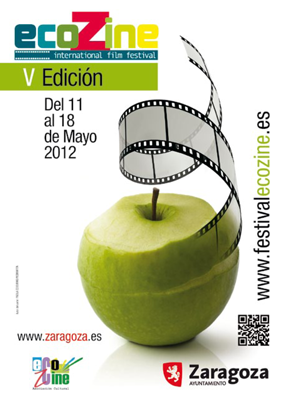 Date: 11 May - 7 June 2012
Date: 11 May - 7 June 2012
Place: Ebro River Environmental Centre, Zaragoza, Spain
On Friday 11 May 2012, at 7pm, the ‘Water is life’ touring exhibit was inaugurated as a side activity of the Ecozine Festival at the Ebro River Environmental Centre, Zaragoza. The exhibit, that takes place from 11 May to 7 June 2012, was presented by Jeronimo Blasco, Councillor for Culture, Education and Environment of the Municipality of Zaragoza, Josefina Maestu, director of the UN Office to support the International Decade for Action ‘Water for Life’, and Pedro Piñeiro, director of the Ecozine Festival.
The touring poster exhibition 'Water is Life' featured a series of posters from a competition organized for the Decade by the Berlin University of Arts, Germany, and the Institute of Fine Arts of Nanjin, China. The exhibition takes place in the Ebro River Environmental Centre in collaboration with the UN Office to support the International Decade for Action ‘Water for Life’/UN-Water Decade Programme on Advocacy and Communication (UNW-DPAC) and Ecozine Festival.
>> Ecozine Festival
>> Access the 'Water is Life' exhibit 
Journalist workshop 'Journalists towards Rio+20. Challenges, tools and solutions for covering the United Nations Conference on Sustainable Development'
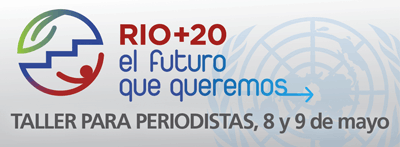 Date: 8-9 May 2012
Date: 8-9 May 2012
Place: Mexico city, Mexico, and online
Organized by the United Nations Information Centre (UNIC) for Mexico, Cuba and the Dominican Republic, this two day workshop for journalists from Latin America and the Caribbean and other regions of the world counted with the participation of more than 15 agencies of the United Nations System as well as with representatives from Governments and the civil society. The workshop dealt with different thematic issues addressed by the United Nations Conference on Sustainable Development (Rio+20), which will take place in Brazil from 20 to 22 June 2012. This exercise provided to media representatives information and basics to cover the summit, should they be on site or following the Summit from distance.
The workshop took place on 8 and 9 May, each day from 9am to 5pm (Mexico City time). It was conducted in Spanish with translation into English. Representatives from United Nations and high level international experts exposed, discussed and debated the main themes of the broad Rio+20 agenda. Key issues such as employment, energy, water, cities, disasters, health, gender, environment, sustainability and many more were discussed with special focus on finding the newsworthy part of the debate. The workshop also introduced logistical details, such as accreditation for journalists, accommodations, online information resources, media facilities, official summit agenda, side events, among others, that might be of help for journalists to cover the Rio+20 summit.
Journalists could participate:
- Attending one of the fora taking place in different cities in Latin America;
- Online through live webcast. Journalists were also able to interact with the experts and send their comments and questions through live chat.
UNW-DPAC participated in the workshop with a presentation on the link between water and Rio+20. Josefina Maestu, UNW-DPAC coordinator, introduced the UN-Water messages for Rio, the work done in preparation for the Conference and the most important water-related issues in the negotiation of the Rio Declaration.
>> Journalist workshop
>> Programme
>> Video recording of workshop sessions
>> Video recording of workshop session on 'Water and Rio+20'
Roundtable on the green economy
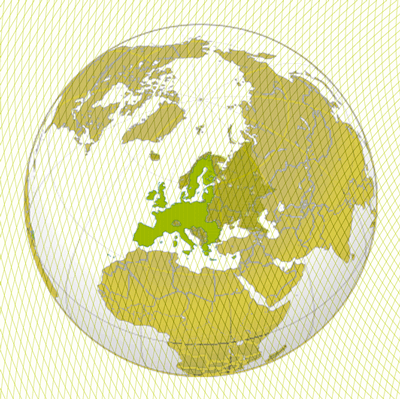 Date: 9 May 2012
Date: 9 May 2012
Place: Zaragoza, Spain
In the framework of the Europe Week, the French Institute in Spain organized a conference and roundtable series on “Sustainable development and territory”. On 9 May, UNW-DPAC participated in a roundtable on “The green economy”. This roundtable, moderated by Mr. Víctor Viñuales, director of the Foundation for Ecology and Development (ECODES), took place at 7pm at the María Moliner Library of the University of Zaragoza, Campus San Francisco.
>> Europe Week Programme
Closing ceremony of the Master on Water Resources and the Environment
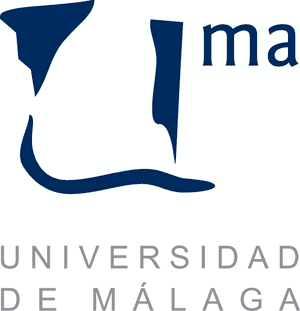 Date: 25 April 2012
Date: 25 April 2012
Place: Malaga, Spain
The Master on Water Resources and the Environment, which is coordinated by the Centre of Hydrology of the University of Malaga, closed its academic year on 25 April. During the closing ceremony, Josefina Maestu, Director of UNW-DPAC, gave a lecture on the Role of economic instruments and global water problems, based on the conclusions of the Chapter on Valuing Water of the 4th World Water Development Report.
UNW-DPAC at 6th World Water Forum
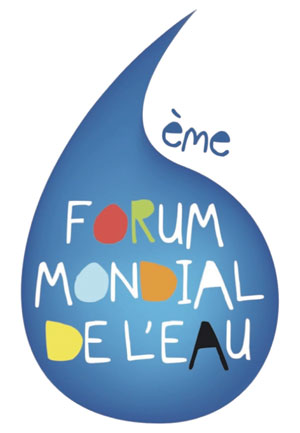 Date: 12 – 17 March 2012
Date: 12 – 17 March 2012
Place: Marseilles, France
UNW-DPAC participates in the 6th World Water Forum co-convening and moderating sessions, acting as session chair or as a panelist in different sessions, and coordinating the UN-Water pavilion in the forum exhibition area. UNW-DPAC focuses its contributions on the green economy and the steps towards Rio+20, particularly on the relevance of valuing water and ecosystem services. UNW-DPAC also contributes to the session on Effective Water Communications and Awareness Raising through Global and Integrated Networks, jointly convened by UNESCO-IHE, UNW-DPAC, WSSCC, IWA and IRC.
>> UNW-DPAC activities at 6th World Water Forum [ - 751 KB]
- 751 KB]
Activities from the UN-Water Office in Zaragoza for World Water Day 2012
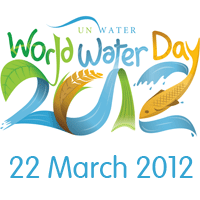 Date: 6 – 9 March 2012
Date: 6 – 9 March 2012
Place: Zaragoza, Spain
In preparation of World Water Day 2012, which this year focuses on 'Water and Food Security', the UN-Water Decade Programme on Advocacy and Communication (UNW-DPAC) co-organized two technical events.
- 7 March 2012, from 16:30 to 20:30: Dialogue on water and food security: expectations from arid countries for Rio+20

 organized by UNW-DPAC with the support of the Ebro River Basin Authority (CHE). Venue: CHE Headquarters, Plenary Room. Water quantity and water quality challenges under uncertainty scenarios for arid countries together with technological approaches were discussed and showcased. Participants from Argentina, Armenia, Australia, Brazil, Burkina Faso, Kyrgyzstan, Morocco and Tajikistan will participate in this dialogue.
organized by UNW-DPAC with the support of the Ebro River Basin Authority (CHE). Venue: CHE Headquarters, Plenary Room. Water quantity and water quality challenges under uncertainty scenarios for arid countries together with technological approaches were discussed and showcased. Participants from Argentina, Armenia, Australia, Brazil, Burkina Faso, Kyrgyzstan, Morocco and Tajikistan will participate in this dialogue. - 8 March 2012, from 11:00 to 14:30: Challenges of irrigation and food security

 organized by the SMAGUA International Exhibition and the Ebro River Basin Authority (CHE) with the support of UNW-DPAC and the Spanish Federation of Irrigation Communities (FENACORE). Venue: Zaragoza Fair, Plenary Room. Most part of food production and food security in arid countries is closely linked to irrigation management. It is expected this connection between food security and irrigation increases along the 21st century. This session focused on dialogue and experience exchange in order to contribute to the analysis of the singular challenges of irrigation.
organized by the SMAGUA International Exhibition and the Ebro River Basin Authority (CHE) with the support of UNW-DPAC and the Spanish Federation of Irrigation Communities (FENACORE). Venue: Zaragoza Fair, Plenary Room. Most part of food production and food security in arid countries is closely linked to irrigation management. It is expected this connection between food security and irrigation increases along the 21st century. This session focused on dialogue and experience exchange in order to contribute to the analysis of the singular challenges of irrigation.
Conclusions and recommendations from both sessions will be presented during celebrations of World Water Day 2012 in Spain.
Also from 6 to 9 March 2012 the 'Water is Life' poster exhibition  , organized by UNW-DPAC and partners, were displayed in Pavilion 6, D/19-25 at the SMAGUA Fair.
, organized by UNW-DPAC and partners, were displayed in Pavilion 6, D/19-25 at the SMAGUA Fair.
>> Summary of activities in Zaragoza, Spain [
 - 93 KB]
- 93 KB]
>> Summary and conclusions from the 'Dialogue on water and food security: expectations from arid countries for Rio+20' [
 - 105 KB]
- 105 KB]
>> Summary and conclusions from the session 'Challenges of irrigation and food security' [
 - 250 KB]
- 250 KB]
Water for cities: responding to the urban challenge. Utrecht, Netherlands
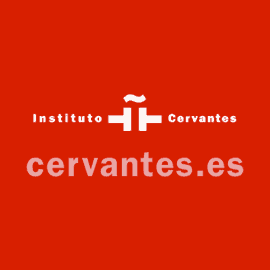 Date: 8 March 2012
Date: 8 March 2012
Place: Utrecht, Netherlands
UNW-DPAC, in collaboration with the Cervantes Institute, starts a new conference series on the water issue. In 2012, this conference series focuses on water challenges in cities and opened at the Instituto Cervantes in Utrecht on 8 March 2012 at 19:00. Mr. Roberto Calzadilla Sarmiento, Ambassador Bolivia to the Netherlands, and Ms. Pilar Gonzalez Meyaui, information and awareness-raising expert at UNW-DPAC, participated in the first event of this conference series.
>> Programme agenda

>> UNW-DPAC home
>> In the news
>> What we do
>> Where we are
>> Visual identity
>> Events Agenda
>> Internship programme
>> Media Programme
>> UN Water Dialogue Series in Casa Solans
>> 'Water for Life' UN-Water Best Practices Award
>> 'Water for Life' Voices Exhibit and Campaign
>> Zaragoza Conferences
>> World Conference Series
>> Bimonthly Publications Review
>> Information briefs
>> Readers
>> Special reports
>> Water facts and figures
>> Thematic video series
>> Conference video series
>> UNW-DPAC external evaluation of 2011-2015 workplan [ - 209 KB]
- 209 KB]
>> Biennial Report 2014-2015 [ - 1.18 MB]
- 1.18 MB]
>> Biennial Report 2012-2013 [ - 1.18 MB]
- 1.18 MB]
>> Biennial Report 2010-2011 [ - 566 KB]
- 566 KB]
>> Annual Report 2009
[ - 1.05 MB]
- 1.05 MB]
Copyright | Terms of use | Privacy notice | Site Index | Fraud alert | Help






